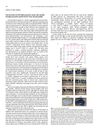 38 citations,
January 2009 in “Journal of Cutaneous Medicine and Surgery”
38 citations,
January 2009 in “Journal of Cutaneous Medicine and Surgery” A woman developed hair loss after starting a treatment with adalimumab, suggesting this medication might cause hair loss.
36 citations,
August 2022 in “Molecular Therapy — Nucleic Acids” Gene therapy shows promise for healing chronic wounds but needs more research to overcome challenges.
36 citations,
June 2015 in “International journal of toxicology” Trichloroethylene causes skin inflammation in mice by increasing certain immune proteins.
 34 citations,
August 2011 in “Journal of Natural Medicines”
34 citations,
August 2011 in “Journal of Natural Medicines” Puerariae Flos extract may help treat hair loss by blocking a hair loss-related enzyme and promoting hair growth.
29 citations,
October 2020 in “Environmental health perspectives” Five preservatives may disrupt hormone function and need more health and environmental risk assessment.
 25 citations,
December 2018 in “Human Molecular Genetics”
25 citations,
December 2018 in “Human Molecular Genetics” The document concludes that certain mutations may contribute to the inflammation in hidradenitis suppurativa and suggests that targeting TNFα could be a treatment strategy.
 25 citations,
July 2016 in “The journal of investigative dermatology/Journal of investigative dermatology”
25 citations,
July 2016 in “The journal of investigative dermatology/Journal of investigative dermatology” Imiquimod cream activates hair follicle stem cells and causes early hair growth by changing immune cells and certain protein expressions.
 24 citations,
September 2005 in “Journal of Cellular Biochemistry”
24 citations,
September 2005 in “Journal of Cellular Biochemistry” Retinoids increase steroid sulfatase activity in leukemia cells through RARα/RXR and involves certain pathways like phosphoinositide 3-kinase and ERK-MAP kinase.
 23 citations,
September 2011 in “Journal of Dermatological Science”
23 citations,
September 2011 in “Journal of Dermatological Science” Red LED light helps mouse hair grow by increasing growth factors from skin cells.
 21 citations,
April 2010 in “Veterinary Dermatology”
21 citations,
April 2010 in “Veterinary Dermatology” Hydroxychloroquine showed some potential, but overall, the three drugs had limited success in treating lupus in dogs.







